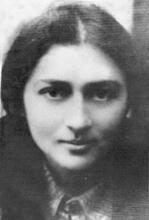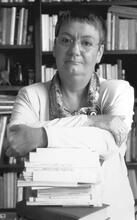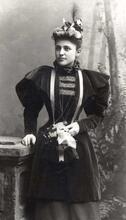Irma May
During the economic devastation of the 1920s, Irma May reported on antisemitism throughout Eastern Europe and raised substantial funds to help Jews overseas. Shortly after May immigrated to the United States from Poland in 1920, her fiancé was killed while doing relief work in the Ukraine. Devastated by the loss, May took up his work, speaking at Columbia later that year on antisemitic attacks on Jewish academics throughout Eastern Europe. As a result, Columbia created a fundraising committee to send aid abroad. May then became the United Jewish Campaign’s special commissioner for Eastern Europe, travelling throughout the region to report directly on the crisis. While she disappeared from public record during the American Great Depression, May’s work helped avert disaster for Jewish communities throughout Europe.
Article
The years following World War I were a perilous time for the Jews of Eastern Europe. In addition to the devastation caused by the war, the entire continent experienced severe economic depression a decade before the United States. Antisemitism grew in the region as Jews were held responsible by local populations for causing the economic downturn. But in truth, the Jews suffered disproportionately from the effects of the depression. With immigration to the United States and other nations of the West severely restricted, the Jews of Poland, Russia, Lithuania, Estonia, Latvia, and surrounding nations faced unemployment, famine, and death.
One activist who had a considerable impact on her fellow Jews in this time of crisis was Irma May (also known as Irma May Abramowicz and Irma Weitzenkorn). She was born in Lemberg, Poland, on June 10, 1899, and came to the United States in 1920. Her own foray into activism on behalf of the Jews of Eastern Europe was motivated by personal tragedy. Shortly after her arrival in the United States, her fiancé, Bernard Cantor of Columbia University, was killed while undertaking relief work in the Ukraine.
Irma May’s first public appeal was to benefit Jewish students and professors in Eastern Europe. Speaking at Columbia with Rabbi Stephen Wise on December 16, 1920, May documented the continued antisemitism in that region. Professors were being dismissed from Polish universities, and Jewish students were no longer being admitted to institutions of higher learning in Poland, Hungary, and Galicia. A committee was formed from the Columbia University Relief Council to raise funds for both the professors and students.
As the 1920s progressed, the situation in Eastern Europe continued to deteriorate for the Jewish population while immigration restrictions in Western nations remained rigid. Unemployment was rampant, and most industries refused to hire Jews. Housing was in short supply; food was scarce, and many people faced starvation. Schools and hospitals began to close. Suicides, a rarity in the Jewish community, became more frequent, especially among those unable to provide for their families. Irma May’s major contributions to the cause of Eastern European Jewry came during this difficult period. Working as the special commissioner for Eastern Europe for the United Jewish Campaign, she traveled to the region and made detailed written reports on the conditions of the Jews to David A. Brown, the national chair.
After her return from her journeys, May made a number of appearances in New York to raise funds for the Jews of Eastern Europe. Her efforts met with great success. Her appearance before the Rabbinate of Greater New York on April 13, 1926, resulted in the group passing a resolution for the Jews of New York to raise six million dollars for their coreligionists. In pursuit of this goal, May’s eloquent speaking helped raise an initial pledge of $3,700,000 at a series of dinners held on April 26, 1926, by the United Jewish Campaign.
Irma May was a pioneer in American Jewish philanthropy. Her reports from Eastern Europe motivated social action, while her political and speaking skills moved both the New York and larger Jewish community.
“Arrives with Plea for Starving Jews.” NYTimes, April 8, 1926, 4.
“Depicts Jews’ Plight in Eastern Europe.” NYTimes, April 14, 1926, 4.
“Gifts of $3,700,000 Open Jewish Drive.” NYTimes, April 26, 1926, 1.
“Jewish Plea at Columbia.” NYTimes, December 17, 1920, 24.
“The Jews of Poland Face Period of Want.” NYTimes, March 26, sec. 9, p. 8.
“Jews of Russia in Pitiable Coniditon.” Aurora Democract, vol. 17, no. 33, May 7, 1926, p. 3.
“To Tell Relief Needs.” NYTimes, April 6, 1926, 4.
WWIAJ (1926, 1928).










